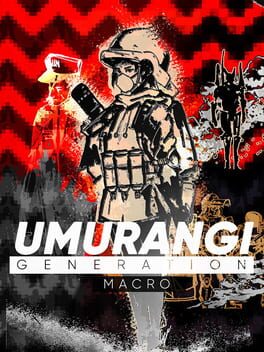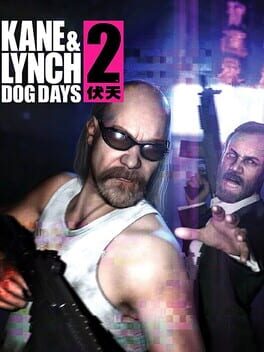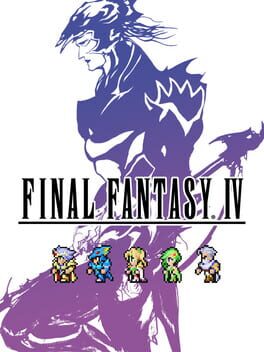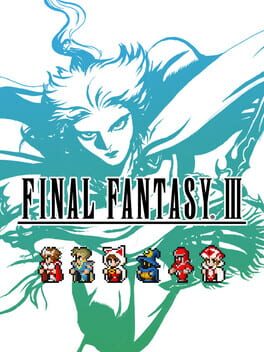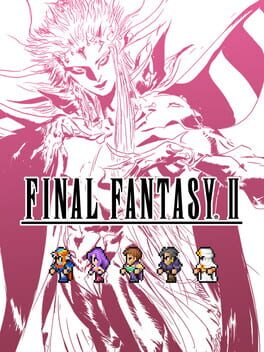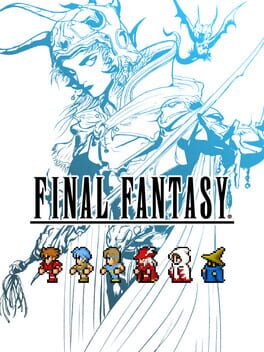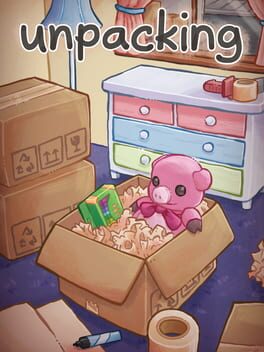GhostGirlMusic
Bio
Occasional games player, just logging stuff for fun.
Occasional games player, just logging stuff for fun.
Badges

Liked
Gained 10+ total review likes

Best Friends
Become mutual friends with at least 3 others

Popular
Gained 15+ followers

3 Years of Service
Being part of the Backloggd community for 3 years

Noticed
Gained 3+ followers
Favorite Games
073
Total Games Played
011
Played in 2024
000
Games Backloggd
Recently Played See More
Recently Reviewed See More
To play Final Fantasy IV is to be forced to appraise it along two axis: against the moment it came out, and in comparison with what JRPGs would become afterward. It is a game that feels at once boundary pushing, palpably energized by the new hardware of the SNES, and simultaneously thin, spinning a tale that would be handily outclassed in terms of complexity within a few short years. I ended up liking FF4! But it is a bit of a strange object, permanently caught in a transitionary period between the evocative bareness of the NES Final Fantasies and Square’s future, more extravagant output.
FF4 goes out of its way to reintroduce the series to new players, often functioning as a greatest hits of the prior games. There’s a gradually intensifying sci-fi narrative bent last hinted at in FF1, affixed onto a plot that feels like an expansion of FF2’s fight against an evil empire (complete with a rotating cast of playable characters), all joined by an expanding world map, breadth of locations, and discrete character abilities that feel in line with FF3. FF4 takes things further by constantly foregrounding its narrative and world in ways that the NES did not allow for. FF2’s opening scene, where your party is cut down by the empire’s troops within the battle screen, feels like the template upon which FF4 bases much of its identity on. Characters have firmly established combat roles with unique abilities (largely modeled on some of FF3’s jobs). They will often leave or join battles mid-fight, meaning that only Cecil is consistently in your party throughout the entire game. “Cutscenes” will often play out as automated battles that you view as an outsider; in one of the game’s best moments, you have to defend against Cecil’s shadow self in order to win and become a Paladin. All of this represents a new interest in integrating characterization into what your party members can do in battle.
This is all very cool to see! But FF4’s actual thematic content lacks depth. Characters typically get One bit of growth or wrinkle to complicate their archetypes. For instance, Cecil has to atone for his sins of pillaging and (accidentally) blowing up a town by becoming a Paladin…and then he’s pretty much good to go from there. Kain tries to be a rival/foil to Cecil (as well as his friend), but continually gets brainwashed. Rosa is a woman. There are characters I have a little more affection for than others (the summoner Rydia, who disappears partway through only to return older and more experienced, is my favorite), but none feel particularly interesting in and of themselves. Nor does the game seek to take its most interesting ideas, like its opening half hour where you work for the bad guys, anywhere other than the path of least resistance. FF4 is therefore in a bit of an awkward position, more interested than ever in emphasizing its narrative but unequipped to fill all that time with something particularly engaging. At least the setting feels at its most diverse and exciting yet! Towns probably get the biggest facelift, filled with the best bits of NPC dialogue in the series so far and demonstrating more of an inclination toward naturalism. There are finally bespoke rooms and buildings you can enter that serve no other purpose than to give the world a little more personality!
Combat also gets a pretty major overhaul with the implementation of the Active Time Battle (ATB) system, wherein each character has a bar that fills up over time before they can perform an action. I like how this represents each character’s agility more, but I personally never got much out of the added focus on reaction time; I kinda wished the wait mode just paused time whenever one character’s bar filled up. More interesting is how the game continually rotates your party members, which effectively ends up de-incentivizing grinding for most of the game (since you could lose a character you’ve put time into building up at any given moment). This meant that the difficulty curve generally resulted in a measured level of challenge throughout most of the game, as you’re encouraged to use each party member’s abilities to get through challenges instead of spending much time leveling them up. It gives the game a similar kind of puzzle-y feeling that FF3 had, although FF4 has the added strength of being able to design battles while knowing the player’s exact party composition.
Reading back over this, I feel like I may be coming off a little more negative than I intend to. Part of this might be due to me playing these early Final Fantasies via their pixel remaster versions; I get the desire to have the NES games at a “comparable” fidelity level to the SNES games, but there’s an aesthetic flattening that occurred in the process that I think dulled my perception of FF4’s generational leap and ambitions. Nobuo Uematsu’s increased compositional acumen shines through more than the game’s art at least; while the IOS version of FF4 PR does not allow one to switch back to the original OST, there’s a comparative scope and playfulness to the PR tracks that feel like they’re drawing on denser arrangements than what were present on the NES. Every facet of the game has some marked addition like this. It makes me excited to see this team’s iWork going forward; if nothing else, FF4 certainly lays a compelling groundwork for future Final Fantasies.
FF4 goes out of its way to reintroduce the series to new players, often functioning as a greatest hits of the prior games. There’s a gradually intensifying sci-fi narrative bent last hinted at in FF1, affixed onto a plot that feels like an expansion of FF2’s fight against an evil empire (complete with a rotating cast of playable characters), all joined by an expanding world map, breadth of locations, and discrete character abilities that feel in line with FF3. FF4 takes things further by constantly foregrounding its narrative and world in ways that the NES did not allow for. FF2’s opening scene, where your party is cut down by the empire’s troops within the battle screen, feels like the template upon which FF4 bases much of its identity on. Characters have firmly established combat roles with unique abilities (largely modeled on some of FF3’s jobs). They will often leave or join battles mid-fight, meaning that only Cecil is consistently in your party throughout the entire game. “Cutscenes” will often play out as automated battles that you view as an outsider; in one of the game’s best moments, you have to defend against Cecil’s shadow self in order to win and become a Paladin. All of this represents a new interest in integrating characterization into what your party members can do in battle.
This is all very cool to see! But FF4’s actual thematic content lacks depth. Characters typically get One bit of growth or wrinkle to complicate their archetypes. For instance, Cecil has to atone for his sins of pillaging and (accidentally) blowing up a town by becoming a Paladin…and then he’s pretty much good to go from there. Kain tries to be a rival/foil to Cecil (as well as his friend), but continually gets brainwashed. Rosa is a woman. There are characters I have a little more affection for than others (the summoner Rydia, who disappears partway through only to return older and more experienced, is my favorite), but none feel particularly interesting in and of themselves. Nor does the game seek to take its most interesting ideas, like its opening half hour where you work for the bad guys, anywhere other than the path of least resistance. FF4 is therefore in a bit of an awkward position, more interested than ever in emphasizing its narrative but unequipped to fill all that time with something particularly engaging. At least the setting feels at its most diverse and exciting yet! Towns probably get the biggest facelift, filled with the best bits of NPC dialogue in the series so far and demonstrating more of an inclination toward naturalism. There are finally bespoke rooms and buildings you can enter that serve no other purpose than to give the world a little more personality!
Combat also gets a pretty major overhaul with the implementation of the Active Time Battle (ATB) system, wherein each character has a bar that fills up over time before they can perform an action. I like how this represents each character’s agility more, but I personally never got much out of the added focus on reaction time; I kinda wished the wait mode just paused time whenever one character’s bar filled up. More interesting is how the game continually rotates your party members, which effectively ends up de-incentivizing grinding for most of the game (since you could lose a character you’ve put time into building up at any given moment). This meant that the difficulty curve generally resulted in a measured level of challenge throughout most of the game, as you’re encouraged to use each party member’s abilities to get through challenges instead of spending much time leveling them up. It gives the game a similar kind of puzzle-y feeling that FF3 had, although FF4 has the added strength of being able to design battles while knowing the player’s exact party composition.
Reading back over this, I feel like I may be coming off a little more negative than I intend to. Part of this might be due to me playing these early Final Fantasies via their pixel remaster versions; I get the desire to have the NES games at a “comparable” fidelity level to the SNES games, but there’s an aesthetic flattening that occurred in the process that I think dulled my perception of FF4’s generational leap and ambitions. Nobuo Uematsu’s increased compositional acumen shines through more than the game’s art at least; while the IOS version of FF4 PR does not allow one to switch back to the original OST, there’s a comparative scope and playfulness to the PR tracks that feel like they’re drawing on denser arrangements than what were present on the NES. Every facet of the game has some marked addition like this. It makes me excited to see this team’s iWork going forward; if nothing else, FF4 certainly lays a compelling groundwork for future Final Fantasies.
Interesting to return to Final Fantasy III now, as it’s one of only a handful of Final Fantasy games that I have prior experience with. I got the DS remake back in my teens and had a decent time with it up to the water temple, where the difficulty seemed to spike dramatically. The prospect of doing a lot of grinding was partially what put me off playing many JRPGs going forward; kind of a funny outcome, given that it probably wouldn’t have been That taxing.
Anyway, approaching the pixel remaster version now I was primarily struck by the surprisingly large scale of FF3. “Scale” seems to be the primary focus everywhere: the game features a huge 44 song soundtrack, numerous modes of transport, a robust job system, and even some honest-to-god optional content! Even the story, which in many ways is the most stock and underwhelming of these NES games, feels at least filled with a fair amount of incident and rotating locales. I can only imagine what it must have been like to have played this when it first came out in Japan and gotten the revelation that the world you’re playing in is only one (floating) continent in a much larger land! I like that this scale also extends toward making the world feel more alive with detail; being able to shrink yourself to explore certain dungeons gives the impression that all of these spaces have whole secret worlds within them, while existing in others where they are but one small component. The game’s light “hidden paths” mechanic (brilliantly tied into your party characters’ sole detail, that they are kids that enjoy exploring) also helps this feeling.
For all this ambition FF3 still remains breezy, taking me less time to complete than FF2 while feeling a lot “bigger” than it. There are more dungeons, but they tend to be shorter and more realistic in scale as opposed to FF2’s massive labyrinths. The game is well balanced; with only a couple instances that required some brief grinding, it managed the trick of making my party feel powerful While being challenged by powerful enemies (especially at the end game). The expansive job system allows for the kind of customization that FF2 aspired to provide, but there’s also an occasional puzzle component to it that I found enjoyable. The only thing really holding back FF3 for me is that the narrative is, again, Very stock. There’s not a ton of satisfaction inherent in “balancing light and dark,” as compared to the vastly more exciting implications of FF1 or some of FF2’s more enjoyable plot maneuvers. But it’s at least a passionately made object, so clearly designed to push a budding development team’s ambitions to the furthest extent they could on the hardware they were working with.
Anyway, approaching the pixel remaster version now I was primarily struck by the surprisingly large scale of FF3. “Scale” seems to be the primary focus everywhere: the game features a huge 44 song soundtrack, numerous modes of transport, a robust job system, and even some honest-to-god optional content! Even the story, which in many ways is the most stock and underwhelming of these NES games, feels at least filled with a fair amount of incident and rotating locales. I can only imagine what it must have been like to have played this when it first came out in Japan and gotten the revelation that the world you’re playing in is only one (floating) continent in a much larger land! I like that this scale also extends toward making the world feel more alive with detail; being able to shrink yourself to explore certain dungeons gives the impression that all of these spaces have whole secret worlds within them, while existing in others where they are but one small component. The game’s light “hidden paths” mechanic (brilliantly tied into your party characters’ sole detail, that they are kids that enjoy exploring) also helps this feeling.
For all this ambition FF3 still remains breezy, taking me less time to complete than FF2 while feeling a lot “bigger” than it. There are more dungeons, but they tend to be shorter and more realistic in scale as opposed to FF2’s massive labyrinths. The game is well balanced; with only a couple instances that required some brief grinding, it managed the trick of making my party feel powerful While being challenged by powerful enemies (especially at the end game). The expansive job system allows for the kind of customization that FF2 aspired to provide, but there’s also an occasional puzzle component to it that I found enjoyable. The only thing really holding back FF3 for me is that the narrative is, again, Very stock. There’s not a ton of satisfaction inherent in “balancing light and dark,” as compared to the vastly more exciting implications of FF1 or some of FF2’s more enjoyable plot maneuvers. But it’s at least a passionately made object, so clearly designed to push a budding development team’s ambitions to the furthest extent they could on the hardware they were working with.
I’ve typically heard Final Fantasy II described as a deeply skippable entry of the series, largely due to the unwieldiness of its “realistic” combat system. I found this characterization a little unfair as I played through the game, as there’s quite a few risks taken that go on to become staples of the series. But played right after the first, FF2 is an often underwhelming experience, stymied by unsatisfying combat and a story that feels more constrained by the NES than its predecessor.
Constraints aside though, FF2’s chief appeal does come from its ambitious narrative. It’s largely a standard story of a rebel kingdom fighting back against an encroaching empire, but there are some fun flourishes that elevate it above something totally unmemorable. There’s a certain “cinematic” angle from the jump, with the game starting with a fight you have no way of winning that causes you to semi-permanently lose one of your party members. This emphasis on uniquely leveraging some of its JRPG systems best manifests in the game’s passwords, where you log different key phrases for use in conversation with important NPCs. It’s not particularly elaborate, but it dovetails well with the structure of the game; you receive quests from the rebel royalty, complete them, and come back to base for new orders. Your fourth party member slot is also taken up by rotating named characters that are engaged in the fight with the empire, widening the scope and granting some affection for them via their presence in battle.
This sense of groundedness is cool and new to this entry, but I did end up missing FF1’s post-apocalyptic mood and escalating sense of possibility. FF2’s large cast and experiments with a “lived in” setting (ie. towns can assume multiple states of being occupied/damaged/destroyed, the empire’s airships zip around on the world map, different NPCs will seem to have some bearing on the plot and attend to their own needs…) are very impressive for the time, and manifest at least a few cool plot moments, but ultimately feel like the first draft of what would lead to games like FF4, 6, and so on. It’s also way more of a bog standard restoration fantasy than the first, which is Fine and all but again speaks to my generally muted enthusiasm for the whole thing.
What’s more annoying is the combat system, which never once felt satisfying in my 15 hours of playing. It’s not really for the reasons that get thrown around, like how you can break the whole thing by attacking your own party members. Frankly, I never experienced challenge at a level that would require such tactics. It’s moreso that my party never reached a point where all three of my core members felt like they were equally contributing to fights. I could count on Firion to kill any enemy in 1-2 turns while Maria, Guy, and whoever my fourth party member was did about as much damage as him combined. And despite putting more effort into rotating through Maria’s magic abilities than any other character, she ended the game as easily the most underpowered (while you spend a quarter of the game searching for the Ultima tome, it did not pay off to solely focus on leveling it up once I got it lol). I can sympathize with Square’s desire to make an RPG with no strict class boundaries, but I ended up feeling punished for pursuing anything other than a two handed fighter or a healer and generally confused by the opaqueness of the systems (you level up your left hand individually???). Despite this, I was still able to roll through the game by just exploiting health and mana regeneration items. It ends up feeling like a lot of fuss for something exponentially less satisfying than FF1’s more basic approach, which is really the core issue with FF2 as a whole.
Constraints aside though, FF2’s chief appeal does come from its ambitious narrative. It’s largely a standard story of a rebel kingdom fighting back against an encroaching empire, but there are some fun flourishes that elevate it above something totally unmemorable. There’s a certain “cinematic” angle from the jump, with the game starting with a fight you have no way of winning that causes you to semi-permanently lose one of your party members. This emphasis on uniquely leveraging some of its JRPG systems best manifests in the game’s passwords, where you log different key phrases for use in conversation with important NPCs. It’s not particularly elaborate, but it dovetails well with the structure of the game; you receive quests from the rebel royalty, complete them, and come back to base for new orders. Your fourth party member slot is also taken up by rotating named characters that are engaged in the fight with the empire, widening the scope and granting some affection for them via their presence in battle.
This sense of groundedness is cool and new to this entry, but I did end up missing FF1’s post-apocalyptic mood and escalating sense of possibility. FF2’s large cast and experiments with a “lived in” setting (ie. towns can assume multiple states of being occupied/damaged/destroyed, the empire’s airships zip around on the world map, different NPCs will seem to have some bearing on the plot and attend to their own needs…) are very impressive for the time, and manifest at least a few cool plot moments, but ultimately feel like the first draft of what would lead to games like FF4, 6, and so on. It’s also way more of a bog standard restoration fantasy than the first, which is Fine and all but again speaks to my generally muted enthusiasm for the whole thing.
What’s more annoying is the combat system, which never once felt satisfying in my 15 hours of playing. It’s not really for the reasons that get thrown around, like how you can break the whole thing by attacking your own party members. Frankly, I never experienced challenge at a level that would require such tactics. It’s moreso that my party never reached a point where all three of my core members felt like they were equally contributing to fights. I could count on Firion to kill any enemy in 1-2 turns while Maria, Guy, and whoever my fourth party member was did about as much damage as him combined. And despite putting more effort into rotating through Maria’s magic abilities than any other character, she ended the game as easily the most underpowered (while you spend a quarter of the game searching for the Ultima tome, it did not pay off to solely focus on leveling it up once I got it lol). I can sympathize with Square’s desire to make an RPG with no strict class boundaries, but I ended up feeling punished for pursuing anything other than a two handed fighter or a healer and generally confused by the opaqueness of the systems (you level up your left hand individually???). Despite this, I was still able to roll through the game by just exploiting health and mana regeneration items. It ends up feeling like a lot of fuss for something exponentially less satisfying than FF1’s more basic approach, which is really the core issue with FF2 as a whole.
